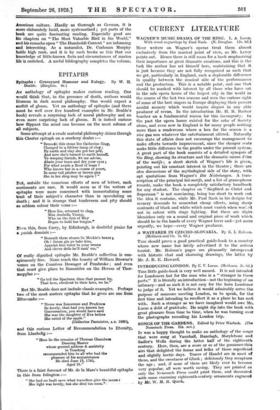EPITAPHS
Epitaphs : Graveyard Humour and Eulogy. By W. H. Beable. (Simpkin. 6e.) AN anthology of epitaphs makes curious reading. One would think that, in the presence of death, authors would blossom in dark moral philosophy. One would expect a surfeit of gloom. Yet an anthology of epitaphs (and there must be well over five hundred examples in Mr. Beable's book) reveals a surprising lack of moral philosophy and an even more surprising lack of gloom. It is indeed curious bow flippant the mind can become on the most solemn of all subjects.
Some attempt at a crude material philosophy shines through this Chester epitaph on a crockery dealer :-
"Beneath this stone lies Catherine Gray, Changed to a lifeless lump of clay By earth and clay she got her pelf, And now she's turned to earth herself. Ye weeping friends, let me advise, Abate your tears and dry your eyes ; For what avails a flood of tears ? Who knows but in a course of years, In some tall pitcher or brown pan She in her shop may be again ? '
But, outside the conscious efforts of men of letters, such sentiments are rare. It would seem as if the writers of epitaphs were more concerned with immortalizing some trait of their subject's character than in speculating on death ; and it is strange that tenderness and pity should so seldom colour their verse :-
"Here lies, returned to clay, Miss Arabella, Young,
Who on the first of May Began to hold her tongue."
Even this, from Carry, by Edinburgh, is doubtful praise for a parish dominie " Beneath these stones lie Meekie's bones ;
Oh ! Satan gin ye take him, Appoint him tutor to your weans And clever dells he'll mak' em."
Of really dignified epitaphs Mr. Beable's collection is con- spicuously free. None reach the beauty of William Browne's verses on the Countess Dowager of Pembroke ; and even that must give place to Simonides on the Heroes of Ther- mopylae " Go tell the Spartans, thou that psiscept by, That here, obedient to their laws, we lie.
But Mr. Beable does not include classic examples. Perhaps two of the most austere epitaphs that he gives are one from Ilfracombe :—
" Never was Innocence and Prudence
So lovely, that had you known her Conversation, you would have said She was the daughter of Eve before She eated of the apple."
(Catherine Parminter, A.D. 1660),
and this curious Letter of Recommendation to Eternity, from Llanbelig :—
" Here lie the remains of Thomas Chamber* Dancing Master whose genteel address & assiduity in Teaching recommended him to all who had the pleasure of his acquaintance He died June 13, 1765, Aged 31."
There is a faint forecast of Mr. de la Mare's beautiful epitaphs in this from Islington :—
" She had no fault save what travellers give the moon Her light was lovely, but she died too soon."


















































 Previous page
Previous page